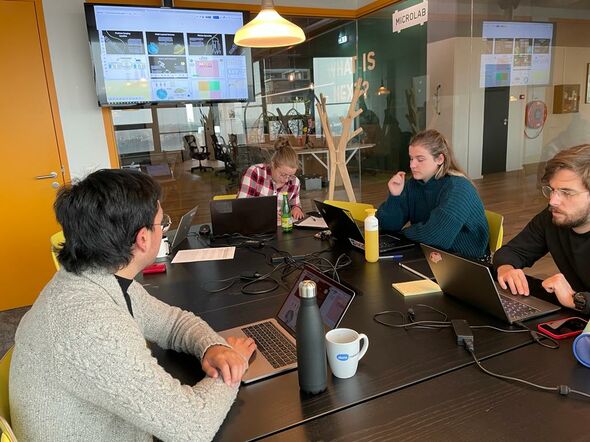
- Campus , People
- 07/12/2021
Travelling to planet Inclusion together
Talking about diversity and inclusion in an organization isn’t always that easy. The topic is a minefield of taboos, prejudices and painful personal experiences, says Chiara Treglia, social innovator and hybrid teacher at Industrial Design. That is why she designed a special conversation tool: the Multiverse Toolkit. When this earned her a grant from the Diversity Fund, she decided to also digitalize her (physical) toolkit. Over the next few days, she will introduce TU/e employees to her toolkit’s methodology, which is based on a space metaphor.
“Sometimes it’s nice to discuss a topic without literally identifying it.” This applies to certain sensitive issues, such as diversity and inclusion, Chiara Treglia says. The Italian designer is one of the people behind Tini Studio, which is located at Sectie-C and Strijp-S. She also works as a hybrid teacher at TU/e, where she teaches the course Design Innovation Methods. In addition, she uses her company to introduce Industrial Design (ID) students to business practice. The official, nice sounding term for that latter role is industry liaison.
Talking about diversity and inclusion – or rather: the lack thereof – is hard, but it’s important that people do so. It helps both employees and the organization. But how do you prevent the discussion from floundering, or people from getting hurt? You’re dealing with unpleasant experiences from employees, who are at odds with the prevailing prejudices within an organization.
Treglia cites a – general – example. “Image that you want you employees to be able to call in sick when they suffer from mental complaints, not just physical complaints. That makes an organization more inclusive to people who suffer from mental health issues. But what if management worries that employees might exploit this possibility?”
Toolkit
In short: a complex matter. Treglia, who went to the Royal College of Art and the Imperial College of London to study for her double master’s degree after she obtained an ID bachelor’s degree in Eindhoven, designed a so-called Multiverse Toolkit for her master’s thesis. A toolkit, only not packed with hammers and screwdrivers, but with rockets, satellites and planets.
After a few tests, these space elements proved to be very suitable metaphors with which the difficult topic of diversion and inclusion can be addressed after all. A ‘satellite’ picks up signals from within the organization, the discussion partners can work together as they imagine what the ‘planet’ they want to travel to will look like, after which they map put their ‘journey into space.’
In addition, Treglia adds with a wink, the average manager – a white man in his 50s – often feels drawn to the theme of space, “because of Star Wars and so on.” That’s a bonus, because they are the ones who make the policy decisions, but who never experience the problems minorities are faced with on the work floor.
No unnecessary luxury
After she returned to Eindhoven, Treglia submitted her Multiverse Toolkit to TU/e’s Diversity Fund as a proposal in 2020. She won a grant and used it to turn her tool into an online platform. No unnecessary luxury in times of corona. Also, the tool has now become accessible to a much larger group of people. “The method also proved successful as an online platform. Participants carry out six assignments together of about a half our each.”
Now, the time has come to introduce the TU/e community to the Multiverse Toolkit. Treglia will give workshops to TU/e employees on Wednesday 8, Thursday 9 and Friday 10 December. You can sign up via intranet for the last few available spots.
“During these workshops, you’ll be introduced to the method, so that you can use it at your own department. The only thing participants need to bring along is their curiosity and an open mind,” Treglia says in conclusion. In time, she would also like to use her toolkit to solve cases at TU/e, to help create a policy that promotes the benefits of diversity and inclusion, and increases awareness of this issue.


Discussion